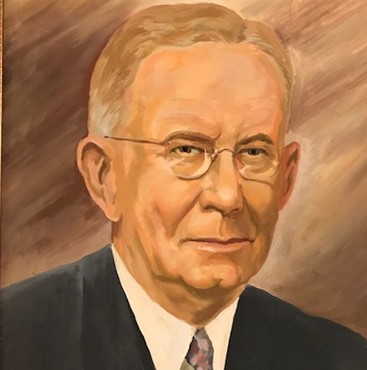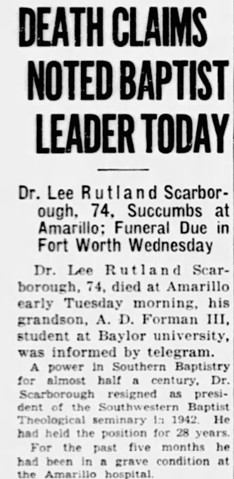Lee Rutland Scarborough
“Through his approachability, humor, and optimism he guided thousands of young men and women into ministry.”
(Rosalie Beck)
Lee Rutland Scarborough: The Evangelist Who Trained a Generation
Dr. Lee Rutland Scarborough (1870–1945) was one of the foremost leaders of the Southern Baptist Convention during the early twentieth century—a preacher, educator, author, and evangelist whose influence helped define the evangelistic spirit of Baptist life for decades. As the successor to B. H. Carroll as president of Southwestern Baptist Theological Seminary, Scarborough combined scholarship with soul-winning zeal, championing the call that the church must never lose its heart for evangelism. His life was a living example of what he taught: a burning passion for souls anchored in the authority of God’s Word.
Early Life and Conversion
Lee Rutland Scarborough was born on July 4, 1870, in Colfax, Louisiana, into a devout Baptist family. His upbringing was marked by hard work, strong faith, and a sense of personal responsibility. His father, Colonel J. R. Scarborough, was a veteran of the Confederate army and a respected leader in their community, while his mother instilled in him a love for Scripture and prayer.
As a boy, Lee showed a sharp intellect and a strong sense of curiosity. He excelled in school and planned to pursue a career in law. He attended Baylor University, where he studied literature and philosophy, and then went on to Yale University for graduate work. During his student years, however, he experienced an inner struggle between ambition and calling.
Though raised in the church, Scarborough’s personal faith deepened while at Baylor under the influence of godly professors and revival preachers. In 1893, he publicly surrendered his life to Christ, sensing that God was calling him not to the courtroom but to the pulpit. The change was dramatic. The young scholar who had dreamed of legal success now felt burdened to bring men and women to the judgment seat of Christ’s mercy.
The Call to Ministry
After his conversion, Scarborough entered full-time Christian service. He began preaching in small Texas churches, quickly gaining a reputation for earnestness, clarity, and conviction. His sermons were marked by intellectual depth combined with heartfelt appeal—a blend that became his lifelong trademark.
In 1898, he accepted the pastorate of the First Baptist Church of Abilene, Texas, where he served for several years. There, his ministry flourished. He was a shepherd who cared deeply for his congregation, but he was also an evangelist who longed to reach the lost. Revivals followed wherever he preached, and his church became a model of evangelistic activity.
During these early years, Scarborough’s path crossed with that of Dr. B. H. Carroll, the towering theologian and founder of Southwestern Baptist Theological Seminary. Carroll recognized in the young pastor both intellectual promise and evangelistic fervor. In 1908, when the seminary was founded in Waco (later moved to Fort Worth), Carroll invited Scarborough to join the faculty as Chair of Evangelism—the first such academic position in the world.
A Pioneer in Evangelism Education
Scarborough’s appointment marked a turning point in Christian education. Until that time, evangelism had rarely been treated as a distinct field of study. Scarborough believed that while soul-winning is primarily a work of the Spirit, ministers could and should be trained to proclaim the gospel effectively.
At Southwestern, he established a program of study that combined theology with practical evangelistic methods. His courses emphasized both the message and the messenger: the unchanging gospel of Christ’s death and resurrection, and the preacher’s responsibility to live and speak under the power of the Holy Spirit.
Scarborough’s approach to evangelism was personal, biblical, and Christ-centered. He rejected mere emotionalism, insisting that true conversions are grounded in repentance and faith. Yet he also warned against cold intellectualism, reminding students that evangelism must spring from a heart aflame with love for souls.
In 1915, he published With Christ After the Lost, a landmark textbook that influenced generations of preachers and missionaries. It became the standard work on evangelism in Baptist circles, blending theology, strategy, and exhortation. In it, Scarborough wrote, “No church is obedient to Christ until it is bringing men to Him.”
President of Southwestern Seminary
When Dr. B. H. Carroll passed away in 1914, the seminary’s trustees unanimously chose Lee Scarborough as his successor. It was a fitting appointment. Under Scarborough’s leadership, Southwestern Baptist Theological Seminary entered a period of remarkable growth. He moved the institution to its present location in Fort Worth and oversaw the expansion of its faculty, facilities, and student body.
Scarborough’s presidency, which lasted until 1942, was characterized by vision and vitality. He believed deeply that theological education should serve the mission of the church, not become detached from it. “Theology without evangelism,” he once said, “is a lamp without oil.”
He urged young ministers to see every sermon as an opportunity to lead men to Christ. He preached with passion in chapel services and in revival meetings across the South, inspiring his students to combine doctrinal soundness with evangelistic zeal. Many who studied under him went on to become pastors, missionaries, and denominational leaders who carried his vision to the ends of the earth.
Denominational Leadership and National Influence
Beyond his role at Southwestern, Scarborough served the Southern Baptist Convention with distinction. He was twice elected president of the SBC (1929–1932) and became one of its most respected voices during a time of expansion and consolidation. His leadership helped strengthen denominational unity and missionary cooperation.
He also played a key role in promoting the 75 Million Campaign, a massive fundraising effort launched in 1919 to support Baptist missions, education, and benevolent work. Scarborough was appointed general director of the campaign, traveling tirelessly across the country to encourage churches. Though the campaign fell short of its financial goal, it marked a new era of cooperative effort among Baptists, and Scarborough’s leadership was widely credited with its partial success.
Throughout his ministry, Scarborough maintained a clear gospel focus. He warned against the creeping secularism and theological liberalism of his time, urging Baptists to hold fast to the authority of Scripture. His preaching was direct yet tender, combining conviction with compassion. He often declared, “We must weep over men before we can win them.”
Personal Life and Character
Lee Scarborough married his beloved wife, Neppie Dumas, and together they raised a family that shared in his ministry. Those who knew him personally described him as kind, approachable, and filled with Christian joy. Despite his many accomplishments, he remained humble and self-effacing, always quick to give glory to God.
He was also a man of deep prayer. His students recalled hearing him interceding earnestly for lost souls and for the young preachers under his care. His spiritual life was the source of his power—steady, disciplined, and sincere.
Final Years and Legacy
After nearly three decades at the helm of Southwestern Seminary, Scarborough retired in 1942, though he continued to write and preach until his death on April 10, 1945. He left behind not only a thriving seminary but a spiritual legacy that shaped the direction of Southern Baptist life for generations.
Today, Scarborough is remembered as the “Father of Evangelism” among Southern Baptists. His influence endures through the seminary that still bears his mark, the books he wrote, and the countless ministers he trained. His portrait hangs in the halls of Southwestern, a reminder that academic excellence and evangelistic passion are not opposites but partners in gospel ministry.
Conclusion
Lee Rutland Scarborough’s life was a rare blend of intellect and inspiration, vision and humility. He believed that evangelism was not merely an activity of the church but its very heartbeat. Through his preaching, teaching, and leadership, he rekindled that heartbeat in countless lives.
His message to every generation remains clear: the church must never lose its soul-winning zeal, for in bringing men and women to Christ, it fulfills the purpose for which it was born. Scarborough lived—and died—on that conviction, leaving behind a legacy that continues to call the church to “go after the lost” with the love of Christ.
_____
Image Source/Credit (in order):
- Admin. “Lee Scarborough.” Christian Hall of Fame, 20 Aug. 2020, christianhof.org/scarborough.
- Newspapers.com, The Waco Times-Herald, April 10, 1945, https://www.newspapers.com/article/the-waco-times-herald/191002858/
Related
Sorry, no records were found. Please adjust your search criteria and try again.
Sorry, unable to load the Maps API.

